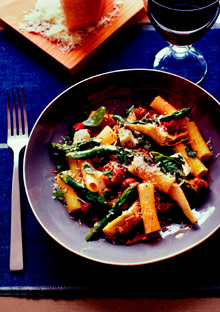Cooking for Beginners

Photo: Ann Stratton
PAGE 3
The instructions are simple: Follow a recipe. To the letter. To leave no room for any substitutions on my part, I look for the shortest recipe possible. I find it in Vegetarian Pleasures, by Jeanne Lemlin: a pesto with only five ingredients. Lemlin is no enabler; she doesn't encourage cooks to add, subtract, or improvise on her simple list: basil, olive oil, garlic, Parmesan cheese, butter. That's it.
Directions are also few. Jeanne instructs me to put the basil, oil, and garlic in a food processor. I do. She tells me to stir in the cheese and butter by hand. I do. She suggests that, in addition to pouring the pesto over pasta, I try it on toasted French bread. I do.
"This is good," Nathan says. It is.
But I'm not there yet—one decent sauce isn't enough to cancel out the gray tuna, the banana-less bread, and all the other mediocre meals I've apologetically served. I want to make that great dinner, that bowl of love, and in order to learn to seduce my husband's stomach, I must go to the one who tempted him, she of the low-cut blouses and the high fat content: Giada. Yes, I'm cooking with the enemy.
"Anytime you add sausage to a pasta dish, you exponentially increase the number of people who are going to love it," she writes in Everyday Pasta of her artichoke, sausage, and asparagus rigatoni. Of course she uses hot sausage, that vixen.
I chose this recipe because it is both familiar (pasta) and unfamiliar (a non-tomato-based sauce). I'm not used to that, so I'm less likely to lose my head and suddenly toss in anchovies. But while reading the instructions, I feel that pull again: "It needs a little more oil, and maybe one more clove of garlic...."
No. Giada studied cooking at Le Cordon Bleu. I studied English at Fordham University. I concede.
The smell of sausage and garlic browning in olive oil fills the kitchen; our apartment smells more like a home already. I add sun-dried tomatoes, bite-size pieces of asparagus, and quartered artichoke hearts. After simmering a few minutes in chicken broth and white wine, the whole thing meets a bowl of steaming rigatoni.
But it's the fresh herbs—the parsley and the basil, chopped just seconds before being tossed into the warm mixture—that transform these disparate food items into a meal. The scent alone is joyful. I love it. I love everything. I even love Giada. If this tastes half as good as it smells, the other woman is my new best friend.
All during dinner, Nathan barely speaks to me. He's busy plowing his way through two helpings of rigatoni.
"That was excellent," he says, spearing a few more forkfuls directly from the serving dish. "The only thing that would've made it better is a little more olive oil. And maybe a touch more garlic."
Oh, don't get me started.
Directions are also few. Jeanne instructs me to put the basil, oil, and garlic in a food processor. I do. She tells me to stir in the cheese and butter by hand. I do. She suggests that, in addition to pouring the pesto over pasta, I try it on toasted French bread. I do.
"This is good," Nathan says. It is.
But I'm not there yet—one decent sauce isn't enough to cancel out the gray tuna, the banana-less bread, and all the other mediocre meals I've apologetically served. I want to make that great dinner, that bowl of love, and in order to learn to seduce my husband's stomach, I must go to the one who tempted him, she of the low-cut blouses and the high fat content: Giada. Yes, I'm cooking with the enemy.
"Anytime you add sausage to a pasta dish, you exponentially increase the number of people who are going to love it," she writes in Everyday Pasta of her artichoke, sausage, and asparagus rigatoni. Of course she uses hot sausage, that vixen.
I chose this recipe because it is both familiar (pasta) and unfamiliar (a non-tomato-based sauce). I'm not used to that, so I'm less likely to lose my head and suddenly toss in anchovies. But while reading the instructions, I feel that pull again: "It needs a little more oil, and maybe one more clove of garlic...."
No. Giada studied cooking at Le Cordon Bleu. I studied English at Fordham University. I concede.
The smell of sausage and garlic browning in olive oil fills the kitchen; our apartment smells more like a home already. I add sun-dried tomatoes, bite-size pieces of asparagus, and quartered artichoke hearts. After simmering a few minutes in chicken broth and white wine, the whole thing meets a bowl of steaming rigatoni.
But it's the fresh herbs—the parsley and the basil, chopped just seconds before being tossed into the warm mixture—that transform these disparate food items into a meal. The scent alone is joyful. I love it. I love everything. I even love Giada. If this tastes half as good as it smells, the other woman is my new best friend.
All during dinner, Nathan barely speaks to me. He's busy plowing his way through two helpings of rigatoni.
"That was excellent," he says, spearing a few more forkfuls directly from the serving dish. "The only thing that would've made it better is a little more olive oil. And maybe a touch more garlic."
Oh, don't get me started.



